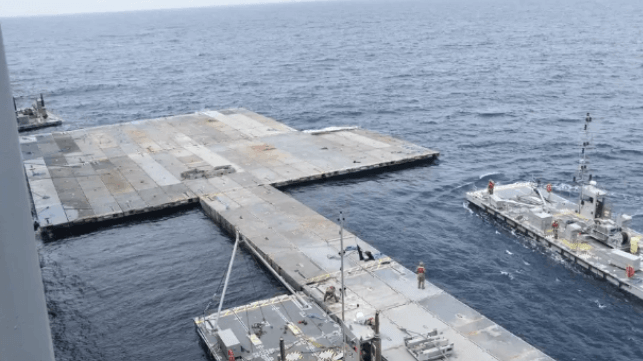U.S. Aid Pier for Gaza Breaks Up in Heavy Weather

The temporary floating pier that U.S. forces constructed to supply aid to Gaza has been damaged in a storm, and its components will be removed from the beach site to the commercial deep-sea port of Ashdod, a modern cargo facility located 30 miles by truck from northern Gaza. In Ashdod's calm harbor, U.S. forces will repair the floating causeway structure, then tow it back to Gaza to restart a Joint Logistics Over The Shore (JLOTS) operation in unsheltered waters.
"We just had sort of an unfortunate confluence of weather storms that made it inoperable for a bit," Pentagon spokesperson Sabrina Singh told reporters Tuesday. "Hopefully just a little over a week, we should be back up and running."
It is the latest in a string of challenges for the floating pier plan. During the logistics operation to set up the pier, one of the sealift ships carrying its components had an engine room fire, forcing it to return to Florida for repairs. After construction began, a patch of rough weather forced the team to withdraw to Ashdod and assemble the pier in a sheltered port. Shortly after it entered operation, three people were injured in a forklift accident as the sealift ship USNS Roy P. Benavidez was unloading, including one person who sustained critical injuries.
Initial deliveries of aid were further delayed by security problems on the ground during early attempts at distribution. Finally, stormy weather over the weekend caused four small American vessels involved in the project to go aground, and U.S. officials have now confirmed that the pier partially broke up.
U.S. Defense Officials revealed today that after a Severe Storm this Weekend off the Coast of the Gaza Strip; a Large Section of the U.S. Army’s Temporary-Floating Pier has “Broken Away” and Drifted down the Coast, with other Sections of the Pier having Partially Sunk in Shallow… pic.twitter.com/lFlLec3NY5
— OSINTdefender (@sentdefender) May 28, 2024
Even before the operation launched, aid organizations questioned its value, given its high cost ($320 million) and comparatively low delivery volume (150 or fewer trucks per day, a fraction of cross-border land transport volume). That critique has intensified because of the slow startup of pier operations and the arrival of what the UN describes as "full-blown famine" in northern Gaza.

that matters most
Get the latest maritime news delivered to your inbox daily.
In an open letter released Tuesday, all major aid NGOs serving Gaza - CARE, Oxfam, Save the Children, Amnesty, Doctors Without Borders (MSF), Mercy Corps, the Norwegian Refugee Council and a dozen others - warned that only cross-border truck deliveries and a ceasefire can avert large-scale fatalities from starvation and disease.
"Between May 7 and 27, just over 1,000 truckloads of aid entered Gaza through all crossing points combined, including the newly built ‘floating dock,’ according to UN counts," the groups warned. "Meanwhile, more than 2,000 aid trucks remain waiting in Arish in Egypt for Israel to allow them entry, with food rotting and medicines expiring as families face heightened levels of starvation a few miles away. . . . The ability of aid groups and medical teams to respond has now all but crumbled, with temporary fixes such as a ‘floating dock’ and new crossing points having little impact."
